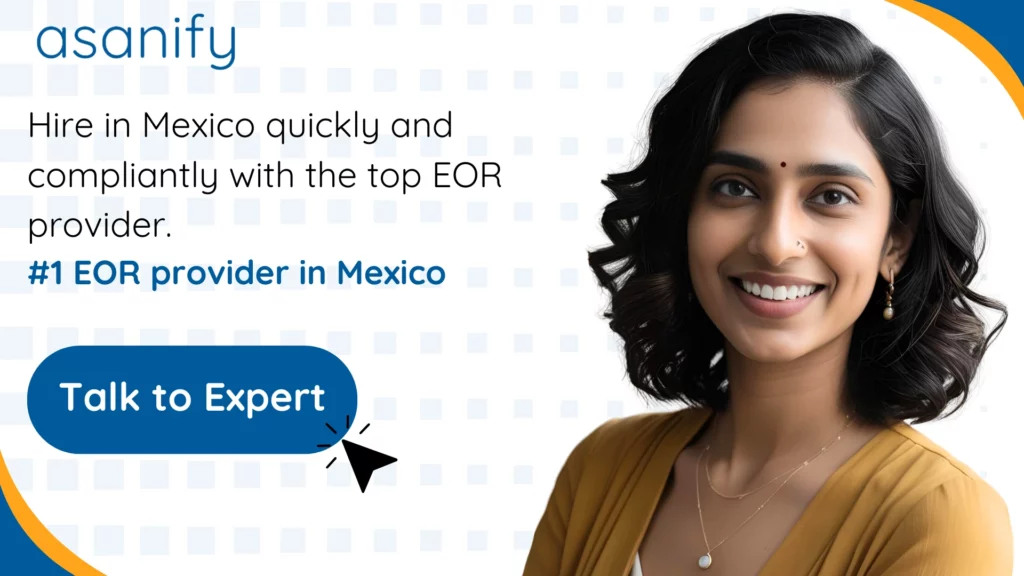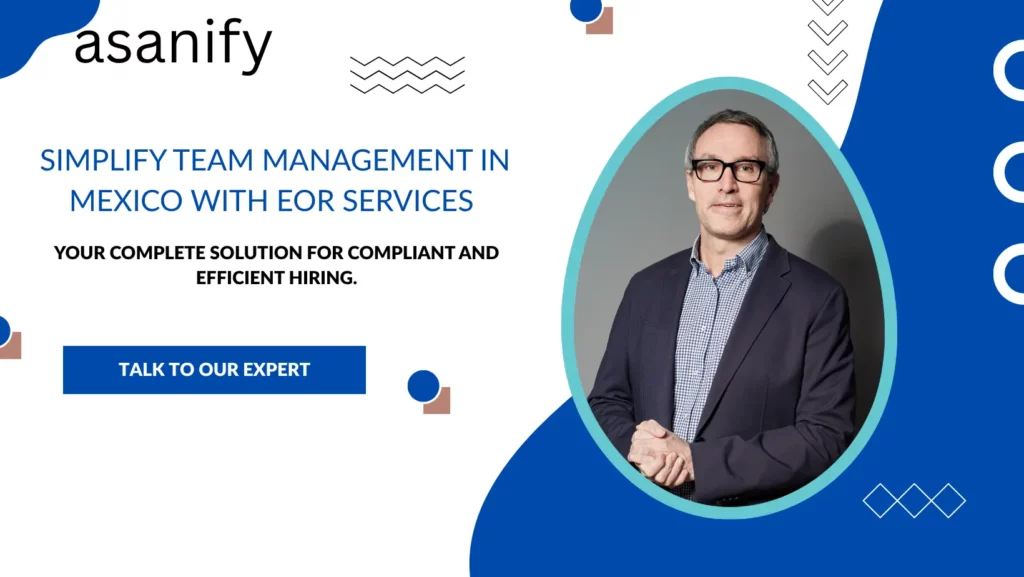Mexico offers businesses a unique combination of a skilled workforce, cost-effective operations, and proximity to North American markets. Whether you’re opening a subsidiary or hiring employees in Mexico, understanding the country’s work authorization process is essential. Securing the correct work permit and visa in Mexico ensures compliance with immigration regulations and a smooth onboarding process for non-Mexican employees.
Table of Contents
- Overview of Mexico’s Work Permit and Visa System
- Understanding Requirements and Eligibility
- Who Needs a Work Visa in Mexico
- Key Conditions for Obtaining a Mexican Work Visa
- Employer and Employee Eligibility
- Types of Work Visas and Permits in Mexico
- Comparing Work Visa Types
- Advantages of the Temporary Resident Visa with Work Authorization
- Application Process for Employers
- Required Documents
- Processing Timelines
- Employer Responsibilities and Compliance
- Legal Obligations
- Consequences of Non-Compliance
- Maintaining Ongoing Compliance
- Tips for a Smooth Application Process
- How an Employer of Record Can Help
- How Asanify Can Help
- FAQs
Overview of Mexico’s Work Permit and Visa System
Mexico has a clear legal framework for employing foreign nationals, managed by the Instituto Nacional de Migración (INM). The requirements differ based on nationality, length of stay, and employment type.
- Mexican citizens and permanent residents – Can work without restrictions.
- Foreign nationals – Must obtain a work visa and/or temporary resident status before starting employment.
- Employer-driven process – Employers often initiate the application before the employee arrives in Mexico.
- INM approval required – The immigration authority must approve the work authorization before the visa can be issued.
- Two-step system – Obtain work authorization first, then secure the correct visa or residence permit.

Understanding Requirements and Eligibility
Before applying, both employers and employees should be clear on Mexico’s work authorization framework. The right permit depends on job role, skill level, and intended length of stay.
Who Needs a Work Visa in Mexico
Any non-Mexican citizen who intends to work in Mexico must have a valid work permit, except in specific exempt categories such as certain short-term business visits.
- Mexican citizens and permanent residents – No work permit needed.
- Unauthorized employment can lead to fines, deportation, or entry bans.
- Even short-term, paid activities generally require authorization.
- Most permits are tied to a specific employer and role.
- Dependents may need separate authorization to work.
Key Conditions for Obtaining a Mexican Work Visa
Applicants generally must:
- Have a confirmed job offer from a Mexico-based employer registered with INM.
- Meet job-specific qualification or experience requirements.
- Provide proof of health coverage in Mexico.
- Maintain a clean criminal record.
Employer and Employee Eligibility
Employers must be registered with INM’s Employer Registry to hire foreign nationals. Employees must meet the job’s minimum education and experience requirements, which can vary by industry.
- INM registration is mandatory before starting any hiring process.
- Registration must be renewed periodically to remain valid.
- Certain industries may require additional certifications or licenses.
- Employee qualifications must match the role described in the visa application.
- Non-compliance can delay or block work permit approvals.
Suggested Read: Employer of Record Mexico: A Comprehensive Guide
Types of Work Visas and Permits in Mexico
Mexico offers several work authorization pathways:
- Temporary Resident Visa with Work Authorization – For employment longer than 180 days but less than 4 years.
- Permanent Resident Visa – For long-term or indefinite stays, usually after holding temporary residency.
- Visitor Visa with Work Authorization – For short-term work stays of up to 180 days.
Comparing Work Visa Types
| Visa Type | Purpose | Duration | Notes |
| Visitor Visa with Work Authorization | Short-term work | Up to 180 days | For temporary assignments or projects |
| Temporary Resident Visa with Work Authorization | Mid to long-term work | 1–4 years | Renewable; employer sponsorship required |
| Permanent Resident Visa | Indefinite work | Unlimited | Requires meeting residency or eligibility criteria |

Advantages of the Temporary Resident Visa with Work Authorization
This visa is the most common for foreign employees in Mexico. It allows multiple entries, can be renewed, and may lead to permanent residency after four years.
- Suitable for both full-time and contract roles.
- Grants legal work rights for up to four consecutive years.
- Allows dependents (spouse and children) to join under family visas.
- Can be converted to permanent residency without leaving Mexico.
- Provides flexibility to change employers with INM approval.
Application Process for Employers
The process starts when the employer applies for authorization to hire a foreign worker through the INM Employer Registry. Once approved, the INM issues a Unique Processing Number (NUT), which the employee uses to apply for the visa at a Mexican consulate in their home country.
Required Documents
- Signed employment contract.
- Copy of employee’s valid passport.
- Proof of qualifications and relevant work experience.
- Employer’s INM registration proof.
- Health insurance documentation.
Processing Timelines
- INM approval: Typically 20–30 business days.
- Visa issuance at consulate: Usually within 10 business days after approval.
- Total process: Around 1–2 months, depending on case complexity.
Employer Responsibilities and Compliance
Employers must comply with Mexican labor and immigration laws to avoid penalties, including:
- Paying salaries that meet legal minimums.
- Ensuring contracts follow Mexican labor law.
- Reporting changes in employment to INM.
- Renewing permits before expiration.
Legal Obligations
- Offer legally compliant employment terms.
- Keep employee records updated with INM.
- Monitor visa and permit expiration dates.
Consequences of Non-Compliance
- Heavy fines from INM.
- Suspension from hiring foreign workers.
- Legal action and reputational damage.
Maintaining Ongoing Compliance
- Conduct periodic immigration compliance reviews.
- Use tracking tools to monitor permit status.
- Keep HR updated on law changes.

Tips for a Smooth Application Process
- Register your company with INM before recruiting foreign talent.
- Start applications early to avoid project delays.
- Double-check document requirements for specific consulates.
- Consider professional immigration assistance or an Employer of Record.
How an Employer of Record Can Help
An Employer of Record in Mexico lets you hire foreign employees without setting up a Mexican legal entity. The EOR becomes the legal employer, handling payroll, benefits, HR compliance, and immigration procedures, while you retain control over daily work management.
Benefits include:
- No need for INM Employer Registry registration.
- Faster hiring timelines.
- Full compliance with Mexican labor laws.
- Localized payroll and benefits management.
Suggested Read: The Complete 2025 Guide to Labour Laws in Mexico
How Asanify Can Help
Understanding and managing Mexico’s work authorization process can be challenging for foreign employers. Asanify provides a complete Employer of Record (EOR) solution, managing everything from securing the correct permits to running payroll and benefits.
With Asanify, you can:
- Hire and onboard talent in Mexico quickly and compliantly.
- Stay compliant with Mexican labor and immigration regulations.
- Expand into Mexico without the cost and complexity of a local entity.
If you aim to grow your team in Mexico efficiently, Asanify’s expertise makes it simple to tap into Latin America’s second-largest economy.
FAQs
Temporary Resident Visas allow stays of up to 4 years; short-term work visas are valid for up to 180 days.
Fees range from MXN 3,000–7,000 depending on the visa type and duration.
Yes, but they still need the appropriate residence and work authorization.
The Temporary Resident Visa with Work Authorization.
Yes, after 4 years of holding temporary residency.
Yes, family reunification is possible with proper visas.
The employee must stop working, and the employer must initiate a renewal or new application.
An EOR handles compliance, payroll, and immigration, allowing you to focus on business growth.
Not to be considered as tax, legal, financial or HR advice. Regulations change over time so please consult a lawyer, accountant or Labour Law expert for specific guidance.

